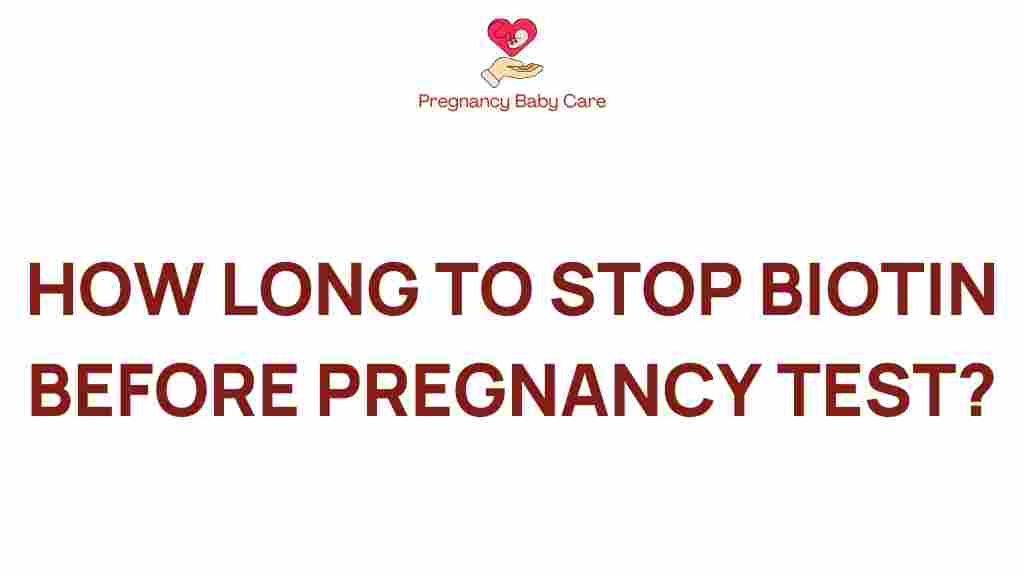The Biotin Dilemma: How Long to Wait Before Your Pregnancy Test?
When it comes to conception and pregnancy, many women are proactive about their health and wellness. They often turn to vitamins and supplements to help support their fertility and hormonal balance. One such supplement that has gained popularity is biotin, a B-vitamin known for promoting healthy hair, skin, and nails. However, there is a dilemma that arises: how long should you wait to take a pregnancy test after consuming biotin? In this article, we will explore the relationship between biotin and pregnancy testing, providing insights into timing, hormonal balance, and women’s health.
Understanding Biotin and Its Role in Fertility
Biotin, also known as vitamin B7, plays a crucial role in various bodily functions, including the metabolism of carbohydrates, fats, and proteins. It’s essential for maintaining healthy cellular function and can positively influence women’s health, particularly during the conception phase. Here are a few ways biotin may contribute to fertility:
- Hormonal Balance: Biotin plays a role in the synthesis of hormones, which can be critical for ovulation and overall reproductive health.
- Metabolism Support: Proper metabolism can help regulate weight, which is an important factor in fertility.
- Cell Growth: Biotin is involved in the growth and development of cells, which is vital during pregnancy.
While biotin is beneficial, it’s important to understand its effects on pregnancy testing. There is a concern that high levels of biotin in the body might interfere with the accuracy of home pregnancy tests.
How Biotin Affects Pregnancy Tests
Pregnancy tests work by detecting the hormone human chorionic gonadotropin (hCG) in your urine. Some studies suggest that high levels of biotin can interfere with the assays used in these tests, leading to false negatives or positives. This interference can occur because some pregnancy tests utilize biotin-streptavidin technology, which can be affected by elevated biotin levels.
Timing Your Pregnancy Test: The Importance of Waiting
When trying to conceive, the timing of your pregnancy test is crucial. Here’s a guideline on how to approach this:
- Wait for Your Missed Period: The best time to take a pregnancy test is after you’ve missed your period, which allows enough time for hCG to build up in your system.
- Consider Your Biotin Intake: If you’ve been taking high doses of biotin, consider waiting at least 24-48 hours after your last dose before taking your pregnancy test.
- Follow Test Instructions: Always read the instructions of the pregnancy test carefully, as tests may vary in sensitivity.
By allowing time between your last biotin intake and testing, you can reduce the risk of false results. This approach is particularly important for women who are actively trying to conceive and are concerned about their health and supplement intake.
Steps to Take Before Your Pregnancy Test
To ensure the most accurate results from your pregnancy test, follow these steps:
- Track Your Cycle: Keep a record of your menstrual cycle to know when to expect your period.
- Monitor Symptoms: Pay attention to early signs of pregnancy such as nausea, breast tenderness, and fatigue.
- Limit Biotin Intake: If you are taking biotin supplements, consider reducing your intake for a few days before testing.
- Choose the Right Test: Select a high-sensitivity pregnancy test for early detection.
- Test in the Morning: For best results, use the first urine of the day when concentrations of hCG are highest.
Troubleshooting Common Issues
If you experience any of the following issues, consider these troubleshooting tips:
- False Negative: If you suspect you are pregnant but receive a negative result, wait a few days and test again, ensuring you have reduced biotin intake.
- False Positive: If you receive a positive result but suspect it may be inaccurate, consult with a healthcare provider for a blood test.
- Irregular Cycles: If your menstrual cycle is irregular, consult with a healthcare professional to better understand your fertility window.
Maintaining open communication with your healthcare provider is essential for women’s health, especially when navigating the complexities of conception and hormonal balance.
Conclusion
The relationship between biotin and pregnancy testing presents a unique dilemma for women who are trying to conceive. While biotin offers numerous health benefits, its potential interference with pregnancy tests necessitates careful timing and consideration. By understanding the role of biotin in hormonal balance and fertility, and by following the outlined steps, women can improve their chances of accurate pregnancy testing.
Always prioritize your health by consulting with healthcare professionals regarding the use of supplements and the best practices for testing. For further information on vitamins and supplements related to fertility, you can explore this resource on women’s health.
In summary, waiting the appropriate amount of time after your last biotin intake can make a significant difference in the accuracy of your pregnancy test, ultimately supporting your journey toward conception. Remember, your health is paramount, and making informed decisions is key.
This article is in the category Pregnancy and created by PregnancyBabyCare Team
